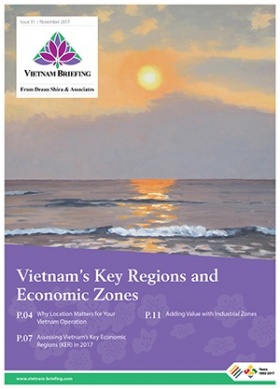Vietnam Climbs 25 Places in World Bank’s Logistics Index
Vietnam jumped 25 spots in the World Banks’s Logistics Performance Index 2018, ranking 39th among 160 countries. Amongst all the major components that were analyzed for comparisons, the highest improvement was seen in Tracking and Tracing and Logistics Competence which rose by 41 and 29 levels respectively.
Logistics Performance Index
The Logistics Performance Index is a biennial study that analyzes a country’s trade logistics performance. The data is derived from a survey of logistics professionals based on the following six indicators:
- Customs – the efficiency of customs and border clearance process;
- Infrastructure – the quality of trade and transport-related infrastructure such as ports, roads, etc.;
- International Shipments – the ease of arranging international shipments with competitive price;
- Logistics competence – the quality of logistics services;
- Tracking and tracing – the ability to track consignments; and
- Timeliness – the frequency with which consignments are delivered within the scheduled or expected delivery time.
Comparison
Vietnam’s global rankings jumped from 64th in 2016 to 39th in 2018. Among the ASEAN member states, its rankings rose from 5th to 3rd during the same period.
In 2016, ASEAN rankings were led by Singapore, Malaysia, Thailand, and Indonesia, while in 2018 Singapore and Thailand led the rankings.
Among the lower-middle-income economies, Vietnam led the global rankings in 2018 followed by India, Indonesia, Côte d’Ivoire, Philippines, and Ukraine.
Survey indicators
Among the six indicators in the survey, Vietnam’s rank in Tracking and tracing and Logistics competence rose the highest, jumping by 41 and 29 spots respectively. Both, customs and infrastructure rose by 23 levels, while timeliness jumped 16 places. The lowest growth was seen in International shipments, which rose only by one spot.
Currently, Vietnamese firms are mostly involved in domestic services such as transportation (air and sea), warehousing, and cargo handling. Firms providing international logistics services usually do so on the behalf of foreign entities.
Going forward, the government not only needs to focus on simplifying administrative reforms but increasing investments in logistics infrastructure and warehouses to strengthen regional connectivity. This will not only reduce logistics costs but also increase Vietnam’s trade competitiveness. Transporation costs alone accounts for more than half of the logistics cost in Vietnam. In 2017, logistics costs reached US$46 billion, nearly 21 percent of the GDP.
Vietnam Briefing is produced by Dezan Shira & Associates. The firm assists foreign investors throughout Asia and maintains offices in China, Hong Kong, Indonesia, Singapore, Vietnam, India, and Russia.
Please contact vietnam@dezshira.com or visit our website at www.dezshira.com.
- Previous Article Vietnam Tightens Multi-Level Marketing Regulations
- Next Article Italia-Vietnam: rapporti commerciali e di investimento
































